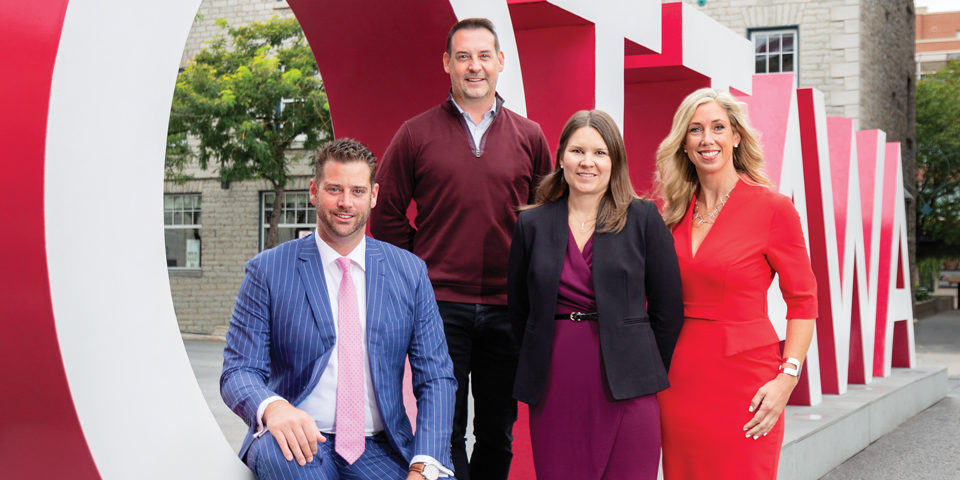Feature – Networking and Risk-Taking Keys to Accelerating Your Business

Left to right: Hugues Boisvert, Greg Skotnicki, Patricia Liptak-Satov, Shelley True
By Alje Kamminga
FOR ENTREPRENEURS, just getting their business off the ground presents its own set of challenges. How do I get the financing I need, how can I be sure there’s a market for my product, what do I name my business, do I need a website, how do I reach my customers, is there anyone out there who can help me? And the list goes on.
For entrepreneurs who overcome these obstacles— those who have achieved an initial degree of success—a new set of challenges emerges. Is it time to expand, what are my competitors doing, how do I attract and retain skilled employees, should I be seeking new markets for my products?
These visionaries have already overcome daunting odds; despite the many challenges, they made their dream a reality. Now they want to make their small business a bigger business, to build on the success they’ve worked so hard to achieve.
In other words, they want to accelerate their business.
Obviously, they’re not alone. Every small business wants to grow and be profitable. But only those who have a clear vision of what they hope to achieve—and have a plan in place to get there—are likely to succeed.
Capital spoke to four successful business owners and operators in the Ottawa area who, in their own way, overcame the perils inherent in entrepreneurship. And, like most entrepreneurs, they weren’t content to scale only the first rung on the ladder to success. They, too, were determined to accelerate their business.
And they did.
Greg Skotnicki, 47, is president of Market Maker Agriculture and an experienced—albeit somewhat bruised—entrepreneur. His first venture as an entrepreneur came in 1998 when he and a school friend opened an alternative healthcare clinic in Ottawa. Although the clinic continues to operate today, Greg acknowledged that the two made a lot of mistakes in the early days.
“Among other things, we were out on our growth and financial projections,” he recalls. “That alone, made it difficult to keep the operation alive.” On the bright side, Greg says, he’s been able to draw on that experience in the ensuing years.
One of the things he’s learned and feels strongly would benefit those looking to expand their business, is to spin off any new company rather than try to grow it within an existing business. “Your current business likely operates in a set way, developed over a number of years. And it probably works very well for that company. But that way of doing things may not suit your startup company. In fact, it may even inhibit its growth.”
Also, while Greg says he’s pleased to see an increase in the number of agencies and organizations created to assist entrepreneurs, he feels that accessing the network of professionals you build over the years is an especially effective way to grow. “Yes, you have to spend time on your business but over the long run, I think you’ll be better served by going outside of your own business to speak to and learn from your network of experienced professionals.”
That approach certainly seems to have worked for Greg—Market Maker Agriculture and its subsidiary, Manderley Turf Products are consistently ranked among the best-managed companies in Canada.
Shelley True, 45, founder and president of the marketing agency TRUEdotDESIGN, subscribes to Greg’s belief that networking— building relationships outside of your business—creates and strengthens relationships with your customers, suppliers and industry partners. As it turns out, they can also be a great source of advice and information when you’re thinking about accelerating your own business.
As Shelley discovered in 2015.
Working on a project together with the owner of the design firm, Avenue Design, Shelley was asked if she would like to purchase the business. “It came totally out of the blue,” she says. “I had absolutely no plans to expand through acquisition.” Still, she recognized immediately that she’d been given a wonderful opportunity to build her business. So she did what she’d done when she opened her own firm, TRUEdotDESIGN, three years earlier—she networked.
“I spoke to lawyers, other entrepreneurs, financial experts—all of those people who could give me the advice and background I needed to make an informed decision.” It wasn’t easy, she says, but her decision to go ahead with the deal eventually paid dividends.
“We not only retained all of our clients, we increased business by 25 per in the first year.”
Clearly, her networking skills were rewarded—something entrepreneurs at every stage of their business careers can learn from. But another lesson, says Shelley, is the fact that all entrepreneurs must be ready to take risks if they hope to succeed. “Entrepreneurs are instinctively risk-takers. It’s important that they respond to that instinct.”
After networking, of course.
Count Hugues Boisvert, 37, the founder and CEO of the boutique law firm, HazloLaw, among those who believe that building and accessing a network of mentors and advisors is paramount for those thinking about accelerating their business. He goes so far as to suggest that entrepreneurs are as well served—if not better—by a board of advisors than by a board of directors.
“Consult people who challenge you,” he says. “And don’t be afraid to ask questions, even of people you don’t know.” Hugues practices what he preaches—he says he’s currently mentoring about 15 young professionals and tries to make himself available to anyone interested in starting or accelerating a business. He is also a regular guest speaker at the MBA program and at the Faculty of Law at the University of Ottawa.
Hugues credits his success—he was named one of Ottawa’s top business lawyers and his firm was named one of the fastest growing companies in Ottawa—to his own mentor, the founder of Grosso & Co. a law firm in Buenos Aires, Argentina specializing in international business law. Hired after being called to the Ontario bar in 2005, Hugues says he found guidance and support from the firm’s founder, Juan Carlos Grosso.
While he looks back on his days in Argentina fondly, Hugues says he’s pleased with the decision to practice international law in Ottawa. “No doubt, Toronto is better known but Ottawa offers a lot of advantages for our firm. Federal government departments like the Export Development Corporation are located here. Foreign officials and businessmen are represented here. It’s a good place to be for any company wishing to expand its reach.”
Those who believe that entrepreneurism is genetic need look no further than OakWood where Patricia Liptak-Satov, 34, is making her mark as the vice-president of operations. Her grandfather, John Liptak Sr., launched a furniture and cabinetry operation in the Ottawa area that later expanded into home renovation and building businesses. All while operating a dairy farm.
“Even while I was in high school I’d go to management meetings,” says Patricia. She was inspired to join the business by “seeing my dad’s passion for it. You take a space and you change (people’s) lives.”
Photos by Kevin Belanger






















